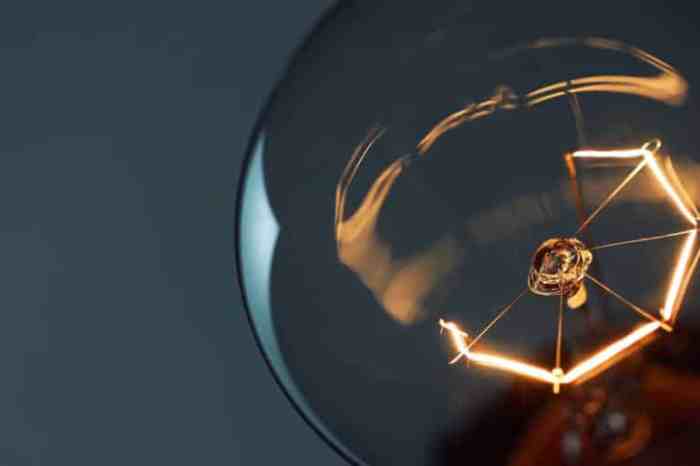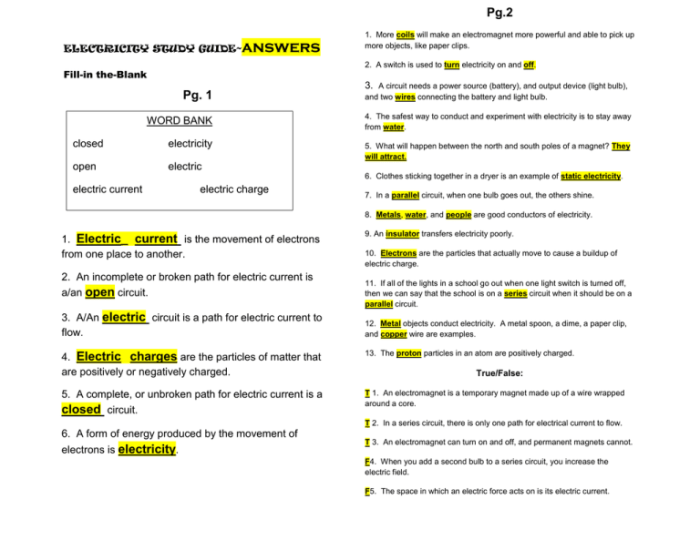Electricity Webquest Answer Key PDF: Unveiling the Fundamentals of Electrical Energy. Dive into the captivating world of electricity with our comprehensive guide, illuminating its principles, applications, and future prospects.
Delving into the intricate tapestry of electricity, this resource unravels the mysteries of electrical phenomena, empowering you with a profound understanding of its generation, transmission, and utilization.
Introduction
Electricity is a form of energy that flows through a conductor, such as a wire or a metal rod. It is essential for modern society, as it powers everything from our homes to our businesses and transportation systems.
Electricity is generated by moving electrons from one place to another. This can be done in a variety of ways, including using fossil fuels, renewable energy sources, and nuclear power.
Types of Electricity
AC vs. DC
There are two main types of electricity: AC (alternating current) and DC (direct current). AC electricity is the type of electricity that is used in most homes and businesses. It is generated by a generator that spins a magnet around a coil of wire.
The spinning magnet causes the electrons in the wire to flow back and forth, creating an alternating current.
DC electricity is the type of electricity that is used in batteries. It is generated by a chemical reaction that causes electrons to flow in one direction through a wire.
Generation of Electricity
Fossil Fuels
Fossil fuels, such as coal, oil, and natural gas, are the most common source of electricity in the world. Fossil fuels are burned to create heat, which is then used to turn a generator that produces electricity.
Fossil fuels are a non-renewable resource, which means that they will eventually run out. They also produce greenhouse gases, which contribute to climate change.
Renewable Energy Sources
Renewable energy sources, such as solar, wind, and hydroelectric power, are becoming increasingly popular as a way to generate electricity. Renewable energy sources are sustainable, which means that they will never run out. They also do not produce greenhouse gases.
Nuclear Power, Electricity webquest answer key pdf
Nuclear power is a controversial source of electricity. Nuclear power plants use uranium to create a nuclear reaction that produces heat. The heat is then used to turn a generator that produces electricity.
Nuclear power is a reliable source of electricity, but it is also expensive and produces radioactive waste.
Transmission and Distribution of Electricity
Electricity is transmitted from power plants to consumers through a network of power lines. Power lines are made of metal wires that are suspended from towers.
Electricity is distributed to homes and businesses through a network of transformers and distribution lines. Transformers are used to change the voltage of electricity so that it can be safely used in homes and businesses.
Electrical Safety
Electricity can be dangerous if it is not used properly. Electrical accidents can cause serious injuries or even death.
To prevent electrical accidents, it is important to follow these safety tips:
- Never touch a live wire.
- Always use a grounded outlet.
- Do not overload electrical outlets.
- Keep electrical cords out of reach of children.
- Never use electrical appliances in wet areas.
Applications of Electricity

Electricity is used in a wide variety of applications, including:
- Lighting
- Heating
- Cooling
- Transportation
- Manufacturing
- Medicine
Electricity has revolutionized the way we live and work. It is an essential part of modern society.
Renewable Energy Sources

Renewable energy sources are becoming increasingly important as a way to generate electricity. Renewable energy sources are sustainable, which means that they will never run out. They also do not produce greenhouse gases.
There are a variety of renewable energy sources, including:
- Solar power
- Wind power
- Hydroelectric power
- Geothermal power
- Biomass power
Renewable energy sources are playing an increasingly important role in the fight against climate change.
The Future of Electricity
The future of electricity is bright. There are a number of emerging technologies that are making it possible to generate, transmit, and use electricity more efficiently and sustainably.
Some of these technologies include:
- Smart grids
- Energy storage
- Renewable energy
These technologies are helping to make electricity more affordable, reliable, and sustainable.
FAQ Insights: Electricity Webquest Answer Key Pdf
What is electricity?
Electricity is a form of energy that results from the movement of charged particles, typically electrons.
What are the different types of electricity?
There are two main types of electricity: alternating current (AC) and direct current (DC).
How is electricity generated?
Electricity can be generated through various methods, including fossil fuels, renewable energy sources, and nuclear power.